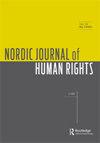鲁吉的双重运动:通过人权尽职调查集合私人和公共
IF 1.2
Q3 POLITICAL SCIENCE
引用次数: 0
摘要
人权尽职调查(HRDD)随着国家法律的强制执行在世界范围内迅速蔓延。看来,尽职调查过程将影响我们在未来几年监管经济活动对环境和人权影响的方式。虽然关于该主题的许多现有学术研究都集中在HRDD的内容及其对企业的具体影响上,但本文将退后一步,调查其基础。特别是,它概述了前联合国秘书长商业与人权问题特别代表约翰·g·鲁吉(John G. Ruggie)的方法背后的核心思想假设,以及他对HRDD的支持。本文认为,Ruggie转向HRDD是基于对双重运动的承诺,既包括通过赋予公司作为治理实体的权力来实现跨国人权治理的私有化,也包括通过引入参与空间、透明度要求和外部问责程序来宣传公司治理。我认为,私有化和公有化之间的紧张关系是人权改革进程的核心,反映了鲁吉将私人和公共重组为一种适合经济全球化的新治理方法的雄心。本文章由计算机程序翻译,如有差异,请以英文原文为准。
Ruggie’s Double Movement: Assembling the Private and the Public Through Human Rights Due Diligence
ABSTRACT Human rights due diligence (HRDD) is spreading fast as national laws mandating it multiply across the world. It appears that the due diligence process is about to shape the way we regulate the environmental and human rights impacts resulting from economic activities for years to come. While much of the existing scholarship on the topic is focused on HRDD's content and its concrete implications for businesses, this paper takes a step back to investigate its foundations. In particular, it outlines the core intellectual assumptions behind the approach of John G. Ruggie, the former UN Secretary-General's Special Representative for Business and Human Rights, and his embrace of HRDD. The paper suggests that Ruggie's turn to HRDD is grounded in a commitment to a double movement, comprising both the privatisation of the transnational governance of human rights through the empowerment of corporations as governance entities and the publicisation of corporate governance through the introduction of participatory spaces, transparency requirements, and external accountability processes. I argue that the tension between privatisation and publicisation is at the heart of the HRDD process and reflective of Ruggie's ambition to reassemble the private and the public into a new governance approach fitted to economic globalisation.
求助全文
通过发布文献求助,成功后即可免费获取论文全文。
去求助
来源期刊

Nordic Journal of Human Rights
POLITICAL SCIENCE-
CiteScore
1.00
自引率
25.00%
发文量
29
期刊介绍:
The Nordic Journal of Human Rights is the Nordic countries’ leading forum for analyses, debate and information about human rights. The Journal’s aim is to provide a cutting-edge forum for international academic critique and analysis in the field of human rights. The Journal takes a broad view of human rights, and wishes to publish high quality and cross-disciplinary analyses and comments on the past, current and future status of human rights for profound collective reflection. It was first issued in 1982 and is published by the Norwegian Centre for Human Rights at the University of Oslo in collaboration with Nordic research centres for human rights.
 求助内容:
求助内容: 应助结果提醒方式:
应助结果提醒方式:


